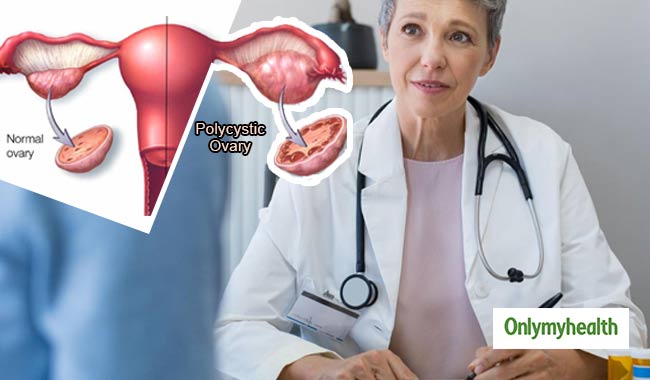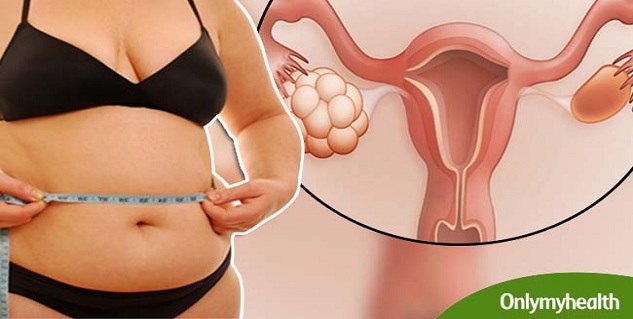
Polycystic Ovary Syndrome (PCOS) is a common hormonal imbalance disorder among women of reproductive age that affects how a woman’s ovaries work. The condition affects millions of women around the world.
Table of Content:-
When a woman has PCOS, she will be diagnosed with at least two of the following: cysts that develop in her ovaries (polycystic ovaries), her ovaries do not regularly release eggs (ovulate), having high levels of "male hormones" called androgens in her body.
Symptoms of PCOS include: irregular periods or no periods at all, difficulty getting pregnant (because of irregular ovulation or failure to ovulate), excessive hair growth (hirsutism) - usually on the face, chest, back or buttocks, weight gain, thinning hair and hair loss from the head, oily skin or acne. Symptoms usually occur during the woman’s late teens or early twenties.

Also Read: 4 Facts about PCOS that every healthy woman needs to know
The exact cause of PCOS is unknown but genetics are suspected to play a huge role in its development. The syndrome can be linked with abnormal hormone levels in the body, including having high levels of insulin.
Treatment for PCOS
Although, there is no cure for PCOS, the condition can be managed to prevent complications. Management goals will depend on the symptoms, and whether or not the woman wants to conceive. The treatment will aim at lowering the patient’s chances of developing heart diseases and diabetes. Most women suffering from PCOS need a combination of treatments to lead a normal life.
Lifestyle Modifications
A lot of women who have PCOS are overweight or obese; and their weight causes further health problems for them. To bring down their weight within a normal range i.e. according to their Body Mass Index (BMI), such women should exercise regularly and eat healthy.
Dietary Changes to Lose Weight
In order to lose weight, women with PCOS must limit their intake of processed and sugary foods. They also should add more whole-grain products, fruits, vegetables, and lean meats to their diet. Even 10 percent weight loss can make your regularise your periods. Weight will lower blood sugar levels, improve body’s use of insulin, and normalize hormone levels in the body.

Use of Birth Control to Regulate Menstrual Cycle
Women with PCOS who do not want to get pregnant can use birth control pills to control their menstrual cycles, reduce male hormone levels, and clear acne. Stopping the pill may cause the periods to become irregular again.
Some doctors may prescribe a medicine that only has progesterone to control the menstrual cycle and reduce the risk of endometrial cancer in women with PCOS; but, progesterone alone cannot help treat acne and excessive hair growth.
Your doctor also may prescribe metformin (Glucophage, Glucophage XR), an oral medication for type 2 diabetes that lowers insulin levels. This drug improves ovulation and leads to regular menstrual cycles.
Also Read: Symptoms of Polycystic Ovarian Syndrome and What we can Do About it
Medication to Help You Ovulate
If a woman with PCOS wants to become pregnant, she may be prescribed clomiphene citrate- an oral anti-oestrogen medication that has to be taken in the first part of the menstrual cycle. The doctor may replace clomiphene citrate with metformin if the former is ineffective.
If both clomiphene and metformin are unable to help the woman to conceive, the doctor may recommend using gonadotropins — follicle-stimulating hormone (FSH) and luteinizing hormone (LH) medications that are administered by injection.

Ways to Reduce Excessive Hair Growth
Birth control pills that decrease androgen production are helpful in reducing excessive hair growth. A medicine called spironolactone is also useful as it blocks the effects of androgens on the skin. However, women who are pregnant or are planning to do so should refrain from taking spironolactone as it can cause birth defects in the foetus. A woman taking this medicine should use an effective method of contraception to avoid pregnancy. A cream eflornithine can also slow down facial hair growth.
If medications don't help you become pregnant, an outpatient surgery called laparoscopic ovarian drilling may be recommended. Your doctor can help you determine if you're a candidate for this type of surgery.
Image Source: Getty
Read more articles on Polycystic Ovary Syndrome.
For more related articles, Download OnlymyHealth App.
How we keep this article up to date:
We work with experts and keep a close eye on the latest in health and wellness. Whenever there is a new research or helpful information, we update our articles with accurate and useful advice.
Current Version